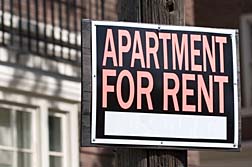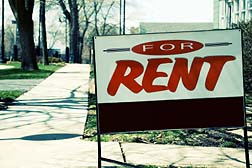LAWSUITS NEWS & LEGAL INFORMATION
Housing, Landlord, Tenant, and Real Estate Lawsuits
Federal law states that a current or potential tenant or house buyer cannot be discriminated against on the basis of race, color, religion, national origin, sex, age, having children, being pregnant, disability or having a past drug addiction. Furthermore, many states and cities have laws preventing discrimination against renters on the basis of marital status or sexual orientation. Finally, the landlord and/or owner of the premises has an obligation to keep the building habitable and free from harmful contaminants.
FREE CASE EVALUATION
Send your real estate claim to a Lawyer who will review your claim at NO COST or obligation.
Get Legal Help Now
Get Legal Help Now
The Fair Housing Act
 The Fair Housing Act—Title VIII of the Civil Rights Act of 1968—prohibits discrimination on the basis of race, color, national origin, sex, religion, familial status and handicap in the renting of a premises. Under the Fair Housing Act, it is illegal to discriminate against tenants or home buyers by refusing to rent or sell housing, refusing to make housing available, refusing to negotiate for housing, setting different terms for rental or sale, providing different services or facilities, falsely denying that housing is available, or threatening or interfering with people making a fair housing complaint.
The Fair Housing Act—Title VIII of the Civil Rights Act of 1968—prohibits discrimination on the basis of race, color, national origin, sex, religion, familial status and handicap in the renting of a premises. Under the Fair Housing Act, it is illegal to discriminate against tenants or home buyers by refusing to rent or sell housing, refusing to make housing available, refusing to negotiate for housing, setting different terms for rental or sale, providing different services or facilities, falsely denying that housing is available, or threatening or interfering with people making a fair housing complaint.Landlords or building owners may also not prevent a disabled tenant or owner from making reasonable modifications to a dwelling if necessary for the disabled person, nor may the owner refuse to make accommodations in the rules, policies, practices or services of the dwelling. This includes allowing a visually impaired tenant or condo owner to have a guide dog, even in a "no pets" building.
An appellate court decision in New Jersey shows that the courts extend this right to considerations of income. The court found that owners of a rental complex could not deny a disabled person access to housing on the basis of income, if her income was supplemented with state-provided assistance.
According to civilrights.org, housing discrimination is a nation-wide problem that is underreported, likely because many people do not fully understand their rights and which activities are prohibited under the Fair Housing Act. The US Department of Housing and Urban Development (HUD) estimates that there are more than two million instances of housing discrimination each year.
Habitable Housing
 Landlords and owners have a responsibility to ensure their premises are habitable. That means that the premises—including houses and apartments—are fit to be lived in and free of unsafe conditions. Unsafe conditions include holes in floors, plaster falling down, improper wiring and vermin infestations.
Landlords and owners have a responsibility to ensure their premises are habitable. That means that the premises—including houses and apartments—are fit to be lived in and free of unsafe conditions. Unsafe conditions include holes in floors, plaster falling down, improper wiring and vermin infestations.Furthermore, the premises must be free of mold and other contaminants, such as lead-based paint.
Other Tenant Rights
Unless there is an emergency situation, tenants have a right to privacy. A landlord may not enter the premises without giving the tenant advance notification.Some rights such as how much security deposit is required to put down and whether a renter should get interest on the deposit, are different from state to state, and renters should find out what regulations apply in their area.
Similarly, rules for how a landlord can evict a tenant vary by state or jurisdiction. There are steps that must be taken before a landlord can evict a tenant; if those are not followed, the tenant could be eligible for compensation for costs paid due to unlawful eviction.
There are also laws that regulate how much an owner can increase the rent and what actions a landlord can take if a tenant is late in paying his rent.
Housing, Landlord and Tenant
A landlord cannot discriminate against you if you have a seeing eye dog, even in a "no pets" building. The premises you rent must be "habitable". This means the apartment or house you are renting is fit to be lived in. There must not be any unsafe conditions, such as holes in the floor, plaster coming down from the ceiling, bad wiring, etc., and there must be no infestation of vermin such as cockroaches or mice. It is the landlord's responsibility to make sure the property he is renting is in livable condition.
The premises you rent must be "habitable". This means the apartment or house you are renting is fit to be lived in. There must not be any unsafe conditions, such as holes in the floor, plaster coming down from the ceiling, bad wiring, etc., and there must be no infestation of vermin such as cockroaches or mice. It is the landlord's responsibility to make sure the property he is renting is in livable condition.It is especially important that your rental unit be free of lead based paint which is toxic when eaten or inhaled by small children and pets, causing low IQ, learning disabilities, Attention Deficit Hyperactivity Disorder (ADD/ADHD), mental retardation, and brain damage.
You would be wise to photograph or video the condition of your premises before you move in - and have dated receipts or time stamped photos or video in case of any disputes when you vacate the premises.
Your Rights
 Unless there is an emergency situation, you have a right to privacy. Your landlord may not enter your premises with out advance notification.
Unless there is an emergency situation, you have a right to privacy. Your landlord may not enter your premises with out advance notification.Other rights vary from state to state, including how much deposit you are required to put down and whether you get interest on your deposit. You should find out what regulations apply in your area.
If you are late in paying your rent, or your landlord is taking action against you, you should be aware of your rights to have proper notice of the action against you, a chance to make up your rent payments, and rights to appeal.
If you are worried that you may be evicted, you should contact a lawyer or a local tenants' association.
REAL ESTATE HOT ISSUES
- Mortgage Related Lawsuits(excessive fees. predatory lending, discrimination)
- California Environmental Disaster Lawsuits gas well lawsuits and gas leak lawsuits, oil spill lawsuit, polluted water lawsuits, contaminated water lawsuits, air quality lawsuits and more
- Hurricane Sandy Lawsuit
REAL ESTATE LAWSUITS
- Porter Ranch SoCal Gas Leak Lawsuit alleging wilful disregard for public health
- Lead Paint Poisoning alleging harmful lead-based products were knowingly sold for decades.
- Florida Premises Liability alleging personal injury caused by property negligence in Florida.
FEATURED LAW FIRM

Israeli Law Firm located in Tel Aviv, specializing in Litigation, Commercial and Corporate Law, International Transactions, Tax Law, Real Estate and Inheritance and Estate matters.
CONTACT THIS LAWYER
Real Estate Legal Help
If you are experiencing problems with a landlord, or have a housing issue, please click the link below to send your complaint to a lawyer to evaluate your claim at no cost or obligation.
Updated on
